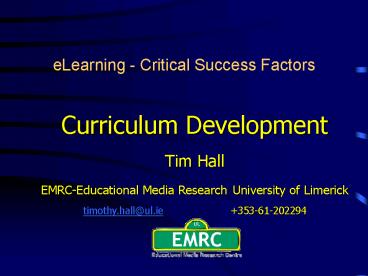eLearning Critical Success Factors - PowerPoint PPT Presentation
1 / 20
Title:
eLearning Critical Success Factors
Description:
CE & Post experiential Learning. EU and International Projects. eLearning ... Assessors/Testers. eLearning - Critical Success Factors Curriculum Development ... – PowerPoint PPT presentation
Number of Views:94
Avg rating:3.0/5.0
Title: eLearning Critical Success Factors
1
eLearning - Critical Success Factors
Curriculum Development Tim Hall
EMRC-Educational Media Research University of
Limerick timothy.hall_at_ul.ie 353-61-202294
2
My Background
- Involvement in
- CE Post experiential Learning
- EU and International Projects
- eLearning
- EMRC-Educational Media Research
3
eLearning - Critical Success Factors Curriculum
Development
- What is curriculum development?
- Is it different in eLearning than for a
traditional face-to face approach?
4
eLearning - Critical Success Factors Curriculum
Development
- What is it ?
- Define appropriate learning objectives
- Establish useful learning experiences
- Organise learning experiences to maximise
cumulative effect - Evaluate the process and revise to improve
effectiveness (Tyler 1949)
5
eLearning - Critical Success Factors Curriculum
Development
- What is it?
- A continuum from macro to micro
- Schools curriculum
- Curriculum for a degree programme
- The Syllabus for a course (module)
- A Lecture plan
- In our context the content and style of an
eLearning course
6
eLearning - Critical Success Factors Curriculum
Development
- Is it different?
- Resource commitment
- Recent IFETS survey of procatitioners found that
the development time for eLearning was in excess
of 110 times delivery time - For face-to-face its less than 10 times
- This implies a much more careful process must
be adopted
7
eLearning - Critical Success Factors Curriculum
Development
- Whats involved?
- People
- Needs Analysis/Required Outcome
- Methodology
- Management Resource Provision
8
eLearning - Critical Success Factors Curriculum
Development
- People Consider fully the needs of a wide
constituancy - Owners (University, company)
- Development Team
- Teachers/Tutors
- Students/Learners
- Customers (Society, Parents, employers)
9
eLearning - Critical Success Factors Curriculum
Development
- People Development Team
- Manager administartive support
- Subject matter experts
- Instructional designers
- Content authors (words media)
- Delivery and support system expert
- Assessors/Testers
10
eLearning - Critical Success Factors Curriculum
Development
- Needs Analysis/Required Outcome
- There are many reasons why an eLearning solution
is contemplated. It may be - The most appropriate
- Expedient
- Required
- Expectation of value for resources expended is
essential
11
eLearning - Critical Success Factors Curriculum
Development
- Methodology Initial factors
- The proposed curriculum must be suitable for an
eLearning delivery - The proposed learning style must be appropriate
and understood by the designers - An appropriate ICT environment must be available
- Learners/Teachers must have access and be
familiar with eLearning - A strategy must be evolved to accommodate any of
these factors that are missing
12
eLearning - Critical Success Factors Curriculum
Development
- Methdology Development
- A team activity where the skills and experience
of the team members are contributed through a
carfully designed and managed process - Or
- An individual process where a subject matter
expert works within an east to use environment
13
eLearning - Critical Success Factors Curriculum
Development
- Methodology Structure Opportunity
- An opportunity to review existing learning
methodology and exploit one which eLearning does
well - A clear framework for the instructional design
stage must be established linking good design of
presentation and navigation to appropriate good
practice in ODL authoring
14
eLearning - Critical Success Factors Curriculum
Development
- Management Resource Provision
- Curriculum design for eLearning must take place
in a supportive institutional framework where the
immediate and on-going resource commitment is
understood
15
eLearning - Critical Success Factors Curriculum
Development
- Curriculum design in an eLearning environment
thus becomes a much more professional activity
than here-to-fore
16
eLearning - Critical Success Factors Curriculum
Development
- But a very big but in most of the above I have
assumed a conventional approach to teaching and
learning with a lecturer/teacher/instructor lead
process based on a traditional curriculum and
syllabus. - I dont teach like that, do you?
- What about other more learner centred approaches?
Collaborative learning? Self-directed learning?
Self-organised learning? Ubiquitous learning?
17
eLearning - Critical Success Factors Curriculum
Development
- Do we have to start over? No, rarely are we
working outside some formalised framework - The people are the same
- The learning needs are the same
- The required resources and ICT support are the
same - The learning environment still needs to be
structured and the learning process facilitated
and managed - A required curriculum is still being followed
18
eLearning - Critical Success Factors Curriculum
Development
- So whats different?
- Content is being discovered, ordered, generated,
digested and synthesized largely by the learners
themselves - The teacher becomes a moderator, mentor, tutor
- A much more rewarding process for all involved
19
eLearning - Critical Success Factors Curriculum
Development
- Curriculum design is still the foundation, a
macro factor that acts as a link between the
intimate eWorld of the student(s)/teacher
interaction and the outside pressures of
assessors, the university/school, education
authorities, society - As formal learning content disappears curriculum
and learning approach remain as tangible
confirmation that the prescribed learning is
taking place
20
eLearning - Critical Success Factors Curriculum
Development
- Curriculum development acts as a link between
society, teachers, learners and resource
providers. - It is essentially a team effort
- It assumes a supportive and well resources
environment































